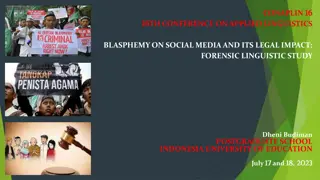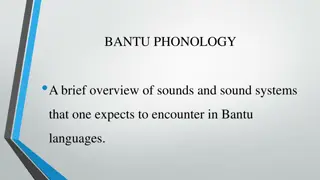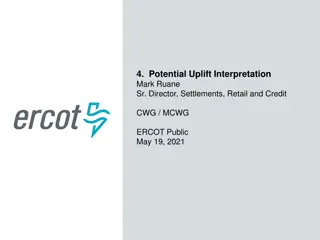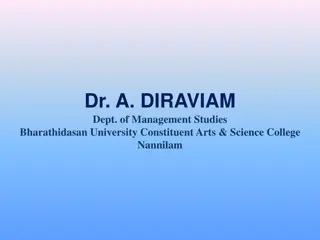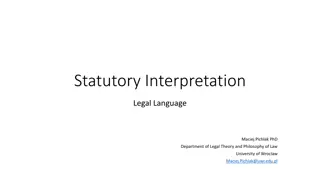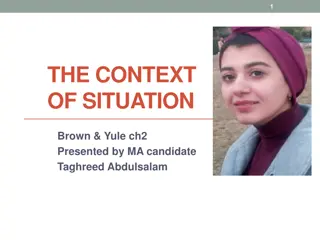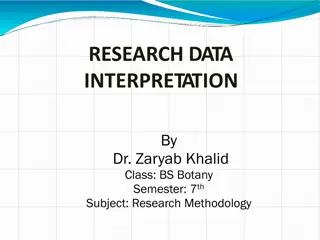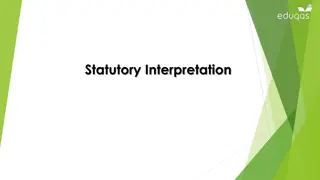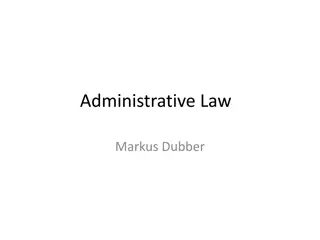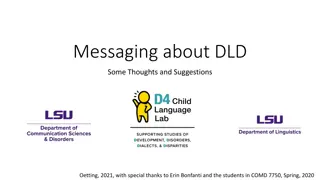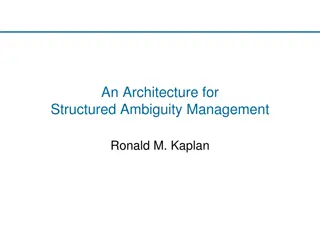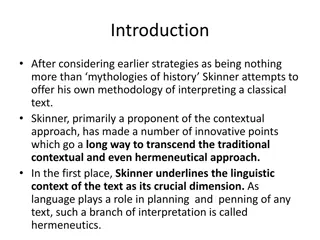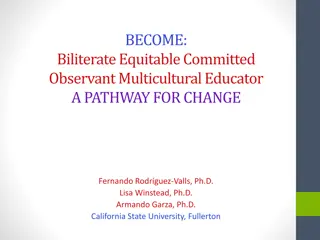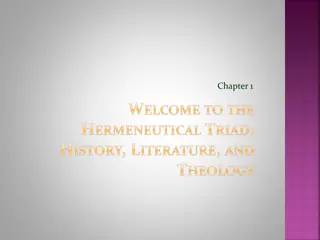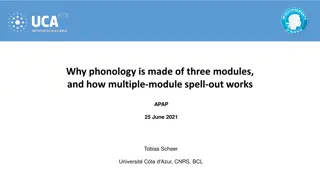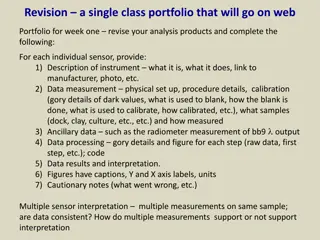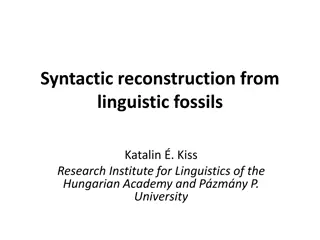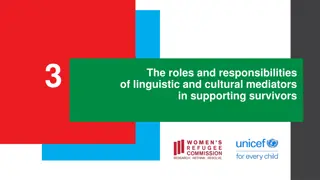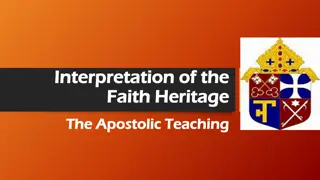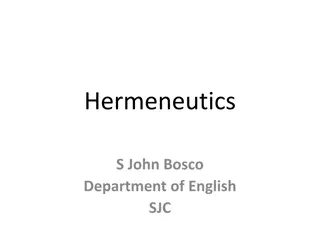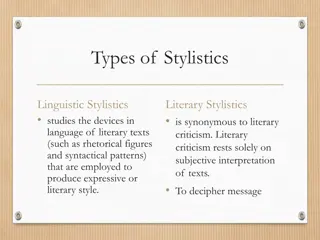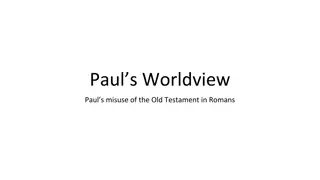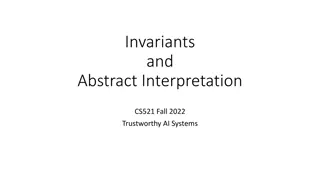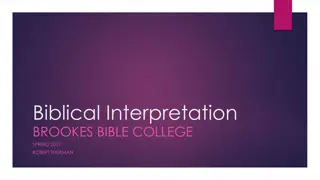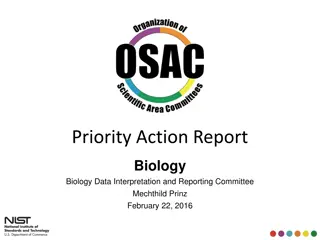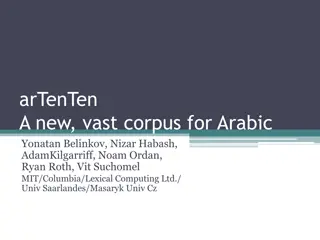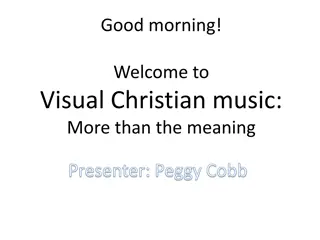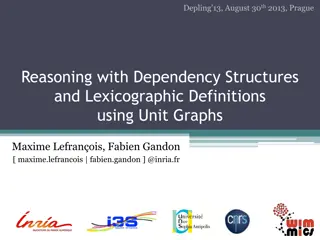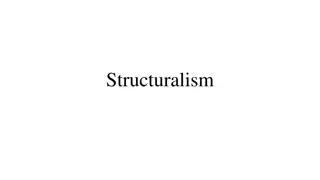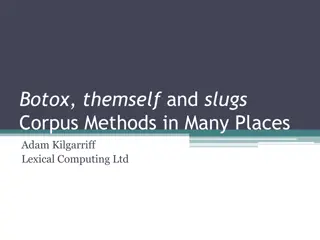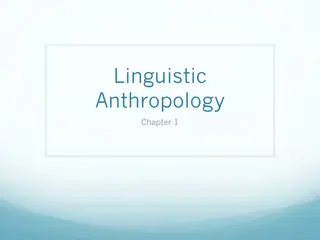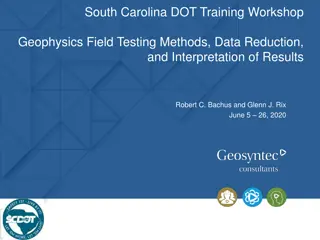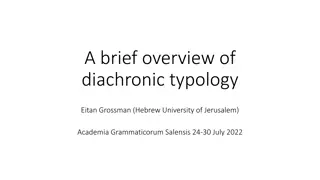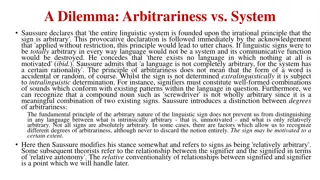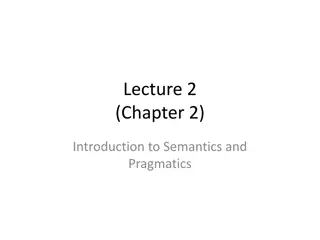Impact of Blasphemy on Social Media: Forensic Linguistic Analysis
Language plays a crucial role in human communication, especially on social media platforms where public speech can have legal consequences. This research delves into the concept of blasphemy on social media and its legal implications, focusing on linguistic forensic study. It explores how language c
7 views • 24 slides
The Significance of Media in Language Learning
Media plays a crucial role in language learning by raising awareness of the ideology behind linguistic structures and providing valuable information on society and culture. Linguists are drawn to media language for research purposes and to understand its impact on language use and attitudes. Media s
12 views • 5 slides
Overview of Stilistik in Bachelor's Studies
Stilistik in a Bachelor's program covers theoretical basics, stylistic concepts, micro and macro stylistics, and key texts in the field. It explores stylistic analysis, linguistic disciplines, communication styles, and the impact of style on various forms of expression including everyday communicati
6 views • 63 slides
Interpretation
Interpretation in research methodology involves drawing inferences from collected data, establishing continuity in research, and developing explanatory concepts for future studies. It helps researchers understand abstract principles, make predictions, and maintain research continuity. Interpretation
4 views • 5 slides
Exploring Bantu Phonology and Linguistic Classification
Delve into the intriguing world of Bantu phonology and linguistic classification, covering the diverse sounds and phonological processes found in Bantu languages. Discover the rich heritage of over 500 Bantu languages in sub-Saharan Africa, classified into zones and classes, shedding light on the fa
0 views • 38 slides
Understanding Potential Uplift Interpretation in ERCOT Protocols
ERCOT's Potential Uplift Interpretation Protocol defines Potential Uplift as the potential uplift to the Counter-Party based on short payments. The protocol outlines calculations and clarifies language ambiguity to ensure accurate interpretation. ERCOT seeks market feedback for further clarification
1 views • 6 slides
Understanding Research Interpretation and Report Writing in Management Studies
Interpretation in research involves drawing inferences from collected facts to find broader meanings of findings. Techniques such as generalization, concept formulation, and consulting experts help ensure correct interpretation. Writing research reports is a crucial component, requiring logical anal
0 views • 25 slides
Understanding Statutory Interpretation in Legal Context
Explore the intricacies of statutory interpretation, linguistic and non-linguistic methods, and types of interpretation in legal contexts. Uncover the significance of legal reasoning, historical perspectives, and comparisons between Anglo-Saxon and Continental legal cultures. Delve into the complexi
1 views • 17 slides
Understanding the Importance of Context in Linguistic Interpretation
Linguists have increasingly recognized the significance of context in interpreting sentences since the 1970s. Contextual features, as discussed by scholars like Firth, Hymes, and Lewis, play a crucial role in understanding utterances within specific social and communicative settings. Co-text and the
0 views • 14 slides
Research Data Interpretation
Principles and methods of data interpretation in research, transitioning from data to knowledge through analysis and inference. Importance of proper interpretation for drawing accurate conclusions and enhancing the value of research findings.
0 views • 33 slides
Advanced Methods of Interpretation: Hermeneutics and Structuralism Lecture at Masaryk University
Understanding interpretation in cultural sociology through hermeneutics and structuralism is explored in Lecture III by Dr. Werner Binder at Masaryk University. The lecture delves into the art of interpretation, focusing on classical hermeneutics, Friedrich Schleiermacher's romantic hermeneutics, an
1 views • 37 slides
Understanding Statutory Interpretation: Rules, Approaches, and Challenges
Explore the concept of statutory interpretation, including the intention of Parliament, problems that can arise, various rules and approaches used in interpretation, aids and presumptions, criticisms, and the relationship between statutory interpretation, EU law, and precedent. The Literal Rule, a c
2 views • 26 slides
Understanding Three Approaches to Statutory Interpretation in Administrative Law
Explore the concepts of Ordinary Meaning, Context, and Three Approaches to Statutory Interpretation in Administrative Law through insightful discussions and relevant examples. Gain a deeper understanding of legal interpretation principles and their application in legal frameworks.
1 views • 14 slides
Linguistic Microaggressions in Messaging about DLD: Thoughts and Suggestions
Linguistic microaggressions in the discourse surrounding Developmental Language Disorder (DLD) can perpetuate negative stereotypes and harm individuals. This content discusses the concept of linguistic microaggressions, explores the ambiguity in messaging about DLD, and highlights the importance of
3 views • 12 slides
Managing Ambiguity in Language: An Innovative Approach
Language presents challenges due to its inherent ambiguity, making it difficult to map between form and meaning. This content discusses an architecture for structured ambiguity management, emphasizing the complexities of linguistic interpretation, modular mapping from text to meaning, and the pervas
0 views • 31 slides
Skinner's Innovative Approach to Textual Interpretation
Skinner's methodology in interpreting classical texts involves a focus on linguistic context, utilizing hermeneutics to uncover deeper meanings. Departing from traditional views, he emphasizes the importance of language and speech-act theory in understanding authorial intentions within broader socia
1 views • 20 slides
Culturally Responsive Biliteracy in Inclusive Education
Culturally responsive biliteracy in inclusive education emphasizes the importance of teaching in two languages, valuing diverse cultural and linguistic identities, and creating a participatory and inclusive classroom environment. Educators play a crucial role in fostering language development and ac
0 views • 12 slides
Exploring Biblical Interpretation: History, Literature, and Theology
Delve into the importance of skilled biblical interpretation, the cost of failed interpretation, and the essential characteristics of a biblical interpreter. Understand the significance of humility, the role of the Spirit, and the need for accuracy in handling the Word of God. Learn about the hermen
0 views • 23 slides
The Three Modules of Phonology and Multiple-Module Spell-Out Systems
Phonology is structured into three modules - Sonority, Laryngeal, and Place - each with its own vocabulary and skeleton for computation. These modules interact in multiple-module spell-out systems to map linguistic structures onto phonetic realizations. Sonority, involving the audibility of linguist
0 views • 67 slides
Comprehensive Sensor Portfolio Analysis for Data Interpretation
This portfolio revision focuses on providing detailed descriptions and analysis of individual sensors for data collection and interpretation. It includes information on instrument specifications, data measurement setups, ancillary data, data processing steps, results interpretation, and cautionary n
0 views • 5 slides
Syntactic Reconstruction from Linguistic Fossils in Uralic Languages
Linguistic fossils provide valuable insights for syntactic reconstruction in Uralic languages like Hungarian, Eastern Khanty, and Samoyedic. Through a case study, constraints on topical objects and grammatical systems are examined using linguistic fragments.
0 views • 34 slides
Understanding the Roles of Linguistic and Cultural Mediators in Support Settings
Linguistic and Cultural Mediators play crucial roles in supporting survivors by facilitating communication, providing cultural context, and offering additional support beyond language interpretation. They serve as bridges between cultures, helping to convey information accurately while remaining imp
0 views • 39 slides
Understanding the Role of Dogmas and Interpretation in Faith Heritage
The interpretation of faith heritage, apostolic teaching, and the role of dogmas in the Church form a foundation of belief that guides the spiritual journey. An authentic interpretation of God's Word is entrusted to the teaching office of the Church, emphasizing the connection between divine truths,
0 views • 9 slides
Understanding Hermeneutics: Exploring Interpretation and Meaning
Hermeneutics, a vital part of theology and philosophy, delves into understanding text and interpretation. Influenced by prominent thinkers like Heidegger and Ricoeur, it emphasizes the historical encounter and personal experience within the world. The concept of hermeneutical circle and the two area
0 views • 24 slides
Understanding Linguistic and Literary Stylistics
Linguistic Stylistics explores devices in language of literary texts to create expressive styles. Literary criticism relies on subjective interpretation, while Stylistic Analysis in linguistics identifies patterns in speech and writing. This content delves into the phonological, graphological, and l
0 views • 17 slides
The Interpretation of Messiah in Paul's Worldview
Paul's interpretation of the Old Testament in Romans is discussed regarding the portrayal of Jesus as Messiah. Scholars debate the alignment between the OT and NT perspectives on Messiah, exploring hermeneutics and biblical interpretation methods. The significance of understanding the Hebrew Bible's
0 views • 27 slides
Understanding Invariants and Abstract Interpretation in Trustworthy AI Systems
Invariants and Abstract Interpretation are crucial concepts in building trustworthy AI systems. This involves defining configurations, concrete semantics, set semantics, and handling programs with loops. Monotonic functions play a vital role in ensuring consistency in the interpretation of these sys
0 views • 22 slides
Importance of Proper Hermeneutics in Biblical Interpretation
Hermeneutics, the science of biblical interpretation, is crucial in understanding and applying the Word of God accurately. It involves rules and methods to determine the intended meaning of the text. Proper hermeneutics ensures correct belief, application, and interpretation of the Bible while avoid
0 views • 170 slides
Forensic Biology Data Interpretation Committee Overview
The Biological Data Interpretation and Reporting Committee focuses on establishing best practices, guidelines, and standards for forensic DNA laboratory interpretation. Their goal is to ensure quality and consistency in the forensic community by standardizing scientifically valid methods of interpre
0 views • 26 slides
The Extension Dogma: Exploring Meaning and Extensions in Linguistic Expressions
The Extension Dogma challenges the assumption that linguistic expressions inherently possess meanings. Instead, it posits that expressions have extensions without necessary meanings that determine them. Theories of meaning should focus on the extensions of expressions, while psychological studies of
0 views • 30 slides
Introduction to arTenTen: A New Vast Corpus for Arabic Linguistic Processing
arTenTen is a new corpus for Arabic containing a vast array of text types, rich metadata, and clean linguistic processing capabilities. It offers a significant improvement over existing Arabic corpora, presenting a larger dataset with a variety of linguistic features. The corpus is fully processed,
0 views • 8 slides
Workshop on Visual Christian Music Interpretation with Peggy Cobb
This workshop delves into the art of interpreting music visually, focusing on incorporating styles, rhythms, and presentation elements to convey the essence of a song in American Sign Language. Participants will explore modern and hymnal Christian music genres, alongside pop and country songs, to en
0 views • 15 slides
Reasoning with Dependency Structures and Lexicographic Definitions using Unit Graphs
This piece discusses the application of knowledge representation in addressing recurrent needs related to manipulating, querying, reasoning, and sharing information, particularly in the linguistic domain of Meaning-Text Theory. Maxime Lefrançois and Fabien Gandon explore formalisms, such as the the
0 views • 56 slides
Understanding Structuralism in Linguistics: An Overview
Structuralism emerged as a dominant approach in linguistic studies from the 1920s to the 1960s, led by figures like Ferdinand de Saussure. This philosophical perspective focused on the study of language as a stable system of signs, emphasizing the interrelation of mental representations of sounds an
1 views • 28 slides
Understanding Linguistic Features in Trademarks and Branding
Explore the nuances of linguistic features in trademarks and branding through topics such as generic vs. name-like words, trade mark infringement cases, capitalization norms, and the significance of corpus analysis in understanding language usage in branding. Discover how linguistic expertise plays
0 views • 22 slides
Understanding Linguistic Anthropology and Anthropology: A Comprehensive Overview
Delve into the realm of linguistic anthropology and anthropology to explore the study of humans, culture, language, biology, artifacts, and more. Discover the four fields of anthropology, the holistic approach, and the importance of cultural relativism while avoiding ethnocentrism. Learn how linguis
0 views • 25 slides
Geophysics Field Testing Workshop: Methods and Interpretation
South Carolina DOT Training Workshop on geophysics field testing methods, data reduction, and interpretation of results by Robert C. Bachus and Glenn J. Rix. The workshop covers suspension logging, borehole geophysical logging, geotechnical testing, and geophysical service companies such as Schlumbe
0 views • 11 slides
Exploring Diachronic Typology and Linguistic Diversity
Delve into the fascinating realm of diachronic typology and linguistic properties across languages in time and space. Uncover the distribution of linguistic features, the past tense in various languages, and the underlying constraints shaping language structures. Discover the intricate interactions
0 views • 99 slides
The Principle of Arbitrariness in Linguistic Signs: Saussure's Insight
Saussure's declaration on the arbitrariness of linguistic signs is thought-provoking, emphasizing that while signs are arbitrary, complete arbitrariness would lead to chaos. He distinguishes between degrees of arbitrariness and acknowledges that signs are not entirely arbitrary, being subject to lin
0 views • 9 slides
Introduction to Semantics and Pragmatics: Understanding Meaning in Language
This lecture delves into the fundamental concepts of semantics and pragmatics, exploring the distinction between extension and intension in language meaning. It discusses the relationships between words, the world, and other linguistic elements, emphasizing the importance of sense, denotation, and r
0 views • 13 slides
